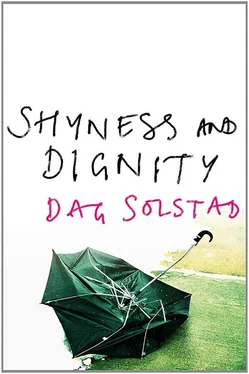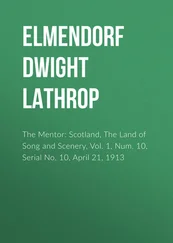Now many things happened in a short time. Eva moved with her little daughter into Elias Rukla’s apartment in Jacob Aalls gate, which was not the small three-room apartment, but a larger four-room place he had acquired by exchange in the same neighbourhood, well, street. That had happened even before Johan Corneliussen had set himself up in his new life in New York. A couple of years later they were married, but Eva kept her name, Linde, her maiden name so-called. Master Rukla must be described as a man contented with his lot as he made his way, light of foot, in thin shoes, to his daily task at the Fagerborg school, up Jacob Aalls gate, past the mud puddles of the mild spring thaw in the month of March, around 1978, and later as well, in spite of the fact that Eva Linde never, not with a single word, said that she loved him. He could not understand why she didn’t, but since she moved in with him, into the new apartment he had acquired, and afterwards agreed to marry him, she must have loved him, but for some reason or other could not say she did. Was it because she feared that he would not believe her if she said it? Was it because it would elicit more questions on his part, about things which had happened that she would refuse to talk about, because it was over, finished? He did not know. But she had come to him, and it was she who had taken the initiative to become intimate. In the morning he ate breakfast with his wife, who was radiantly beautiful, and her rather capricious daughter. That was his new life. In the afternoons and evenings they were together, mostly in the apartment, while her daughter was running back and forth. He slept with her at night, in a private room in the apartment on Jacob Aalls gate furnished for that purpose — yes, this is how he would express it, because to say that he slept with her in the bedroom, or in their shared bedroom, covered so little of what he felt about sleeping with Eva Linde that, to himself, he always called their bedroom ‘that private room which has been furnished for my sleeping with her’, and if it sounded pompous, he would still describe it that way to himself, because this was the way it had to be described, although not in front of others, including Eva, whom it might make embarrassed, just as embarrassed as he would find her to be during intercourse now and then, when she gave herself to him but often with her face half turned away, and he could not tell for certain whether it was an expression of her nature or of something completely different, causing him at times to gasp out, I love you I love you. Then she might stroke the back of his head, or his shoulders, while she looked at him, straight into his eyes though without saying anything, but the fact that she stroked him was sufficient then. At that moment she belonged to him. By the way, she would spend much time in this room, the so-called bedroom, as she had her make-up table there. Both there and in the bathroom were little flasks, tubes, bottles, lipstick, boxes, all lined up, and in such numbers as to make Elias Rukla inclined not to believe his own eyes. She had come to him. Gradually he became acquainted with her. She came to him with several albums of photographs. She sat down on the sofa and showed them to him. Photographs from her youth, which she (eagerly) showed him while telling him about them. Snapshots. From Hønefoss. From the lower Setesdal valley. From a village north of Lillehammer. Bardu. An officer’s daughter growing up in Norway in the 1950s. For him, these photo albums became a treasure chest. They became so very dear to him. He felt honoured to have been chosen to sit like this, looking at photographs from her youth while she eagerly related, with the fervour of recognition in her voice, and he could not help but regard living in the state of marriage as a mystery, on the basis of sitting beside her on the sofa looking at snapshots like this and hearing her repeat the rather banal story behind each of them in a veiled voice. The way to her. The completion of their sexual life, which spread out, taking on the form of a shared everyday life. The daily absorption in, the daily occupation with. Rather than being able to say that he knew her, Elias Rukla could say that he found himself in circumstances where he was occupied with her every day, even when he did not see her, and that he assumed, almost as a matter of course, that it was mutual. She had come into his life, and that shaped his consciousness in a deeply satisfying way. There were many things he did not know about her, which she kept to herself, but what he did get to know was a source of enduring happiness to him. He might see a certain kind of chocolate at the tobacconist’s stand and think, Eva likes that one, and another chocolate and think, That one Eva turns up her nose at. He knew that she preferred tea in the evening, and strong, all too strong, coffee in the morning. He knew what she liked to eat and when, and what she did not like to eat. He knew in what way she was unsure of herself, and how she was able to hide it. Simple, commonplace tricks, which he appreciated finding out about, because it attached her to him, with her unreserved consent. And he was confident that she had come to know him the same way. That all the trifles which he himself, on the whole, did not care very much about, such as his preferring potato chips with paprika, not onions, to go with beefsteak, that he disliked showering in the morning and therefore did it in the evening instead etc., etc., that all these things, in themselves insignificant trifles which he could easily have dispensed with if it had not been for the fact that they had simply turned into habits, unshakeable habits, which he nevertheless did not define as a necessary part of his own identity, were, for her, inseparably connected with being Elias Rukla. And she related intimately to them, so that she made him happy buying potato chips with paprika and serving beefsteak without onions, just as he accepted and was delighted with her habits, giving her what he knew she liked; and although she also, on the whole, regarded these things as rather insignificant, nevertheless this was what united them, this was their interlinked life, in joy, this was the way they lived together and thought about one another. Having turned thirty-six before a woman entered his life in earnest, Elias Rukla set immense store by precisely this, not hesitating to designate it as the mystery of matrimony. He enjoyed the opportunity of pondering what to tell her when he came home, which episodes he should tell her about, and he looked forward to seeing her expression when he would tell her just this, because, he thought, This I certainly believe Eva will be glad to hear! Thousands of hours were spent on such considerations, and thousands of hours were spent on automatic explanations, deliberations, reflections, which he wasn’t even aware he was making, but which were as a whole directed at her and determined his steps, totally. In the middle of a conversation, say, with a colleague in the staff room, or in the middle of a class, he would suddenly catch himself thinking, I have to remember to remind Eva that tonight there is a film with Jack Nicholson which will be discussed in the Film Magazine on TV (he had seen a notice in Dagbladet about it), even though there was nothing in the situation, either as regards his colleagues in the staff room or in his teaching, that could reasonably produce associations in this direction; they were just happy thoughts that popped up, as if to bless his life as a married man. Yes, he had got to know her. And she had let him do so unreservedly, also in roles that were not directly connected with their relationship. She let him freely enter her life as mother (of Camilla), as daughter (with her parents), and as friend (with her women friends, who often visited them), and in the role of his own wife when she stood properly by his side as he proudly introduced her to his colleagues. She had come to him, and she stayed with him. Why, he did not know, but she had come to him and stayed with him. She never said she loved him, but when he had asked her whether she would move in with him if he bought the larger apartment in Jacob Aalls gate, she said yes and came, and when two years later he proposed that they should get married, she looked at him, thought it over carefully, gave him a smile and said yes. But she added that she was Eva Linde. And just then Elias Rukla had thought, Yes, she’s Eva Linde, and I will never get to know why she wants to live with me. But her wanting to is enough, actually more than enough; I’m delighted that she wants to, in spite of the fact that I will never know the reason why she wants to, and it is not certain that the reasons are the same as I wish they would be.
Читать дальше










